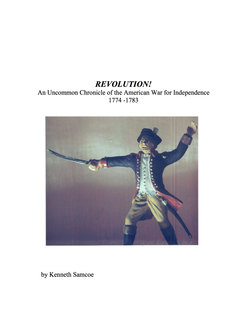Читать книгу Revolution An Uncommon Chronicle of the American War for Independence - Kenneth JD Samcoe - Страница 13
На сайте Литреса книга снята с продажи.
BRITISH ATTACK MAINLAND!
ОглавлениеCHARLESTOWN BURNS!
Militia Offer Stubborn Resistance, Inflict Heavy Losses
The Battle of Breed’s Hill
The General’s (Gage) returns will give you the particulars of what I call this unhappy day. I freely confess to you, when I look to the consequence of it, in the loss of so many brave officers, I do it with horror. The success of it is too dearly bought.
General Howe
To the British Adjutant General
June 24, 1775
Boston, Massachusetts: June 17, 1775. Hundreds of Loyalist sympathizers cheered from Boston rooftops as 2,500 British troops invaded the colonial mainland early this afternoon. Supported by heavy artillery fire from British ships and barges, General Gage’s light infantry and grenadiers, under the command of Major General William Howe, launched an attack shortly after 3 o’clock in the afternoon. Gage ordered the attack when British headquarters woke this morning to discover that Colonel William Prescott’s Massachusetts militia erected earthen breastworks on Breed’s Hill during the night. The hill, which Gage evacuated after his men retreated from Concord, holds a commanding position over Boston. Rebel artillery could now reach the city, posing the first serious threat to the British occupying Boston.
Howe’s light infantry made several costly frontal assaults on Prescott’s fortifications before gaining the advantage.
In an attempt to flank Prescott and capture Bunker Hill to the north, Howe advanced on Prescott’s left, held by the New Hampshire militia under Colonel John Stark. These men were dug in behind a wooden fence that stretched southeast from the Mystic River to a field of high grass where the Connecticut militia under Lt. Colonel Thomas Knowlton took cover.
The surprisingly well disciplined militia waited until British infantry were within forty yards of their lines before mounting several barrages of withering fire that cut down 90 percent of the British columns. Howe’s devastated troops were forced to fall back and regroup four times before General Clinton’s reinforcements arrived to help drive the rebels from their positions. The two-hour battle ended when the rebels ran out of ammunition and retreated across the Charlestown neck.
Gage ordered his artillery to fire on Charlestown when he learned rebel sharpshooters inside the village were firing on his men. Every building went up in flames. Only the charred steeple of its church remains standing.
Preliminary estimates put British losses at over 1,000 men, including 19 officers killed and 70 wounded. General Howe’s entire staff was cut down by rebel fire. Prominent among British casualties was Major John Pitcarin, who ordered the attack at Lexington. Pitcarin was reportedly killed by Peter Salem, a black member of the Framingham militia.
Total rebel casualties were estimated at 400. Dr. Joseph Warren, close friend of Samuel Adams and prominent member of the Massachusetts Provincial Congress, was killed when British infantry overran disorganized rebel troops defending Bunker’s Hill.
Dr. Warren was instrumental in organizing the colonial militia and creating the rebel intelligence network that thwarted British General Gage’s night raid on Concord. Dr, Warren was appointed Major General of the Massachusetts militia a few days before he was killed. British Commander Gage commented that Dr. Warren’s death was worth 500 men to him. Colonel Prescott’s son was also killed in the action at Breed’s Hill.
Gage ordered a halt to the British advance at Bunker’s Hill over the objections of Major General Clinton, who felt his fresh troops could overtake the rebels and drive them from their headquarters at Cambridge. Apparently, General Gage felt the British incurred too many losses in securing the hills of Breed and Bunker and was unwilling to risk Clinton’s troops in any further action this day.
After retreating from Breed’s Hill, a very angry Colonel Prescott rode into Cambridge and demanded to know why his requests for ammunition and reinforcements were ignored. Prescott contended he could have held off Howe’s infantries and secured the hills if General Ward had provided the men and powder. Neither Ward nor his staff, who held back 5,000 men in reserves, had any comments.
